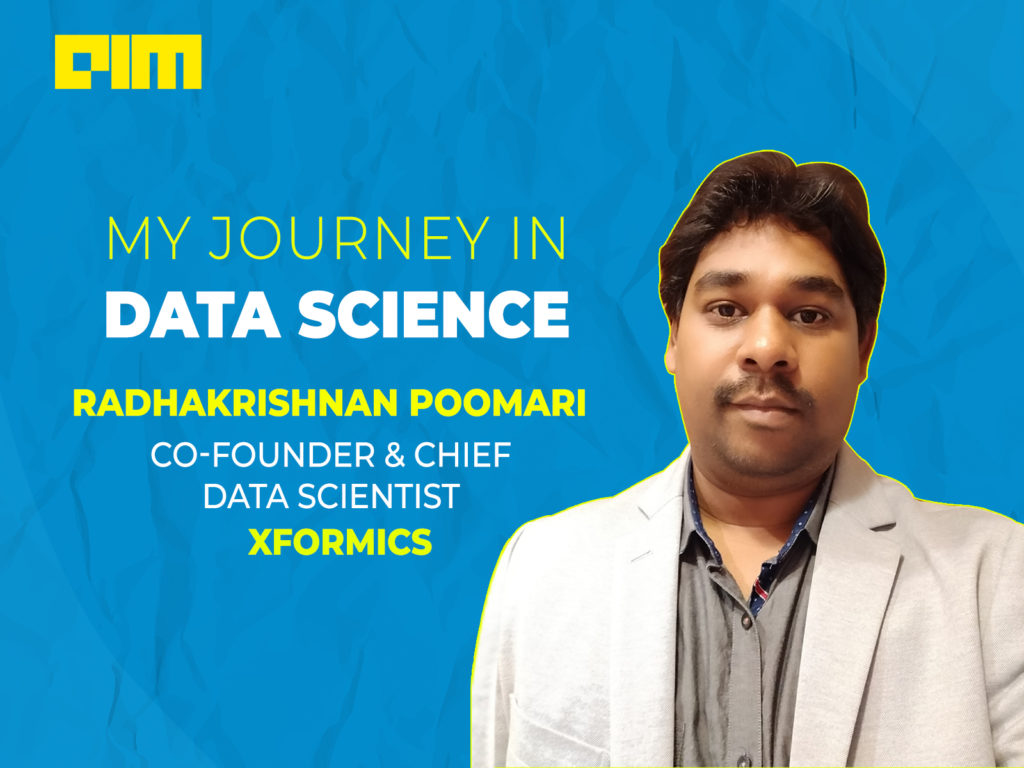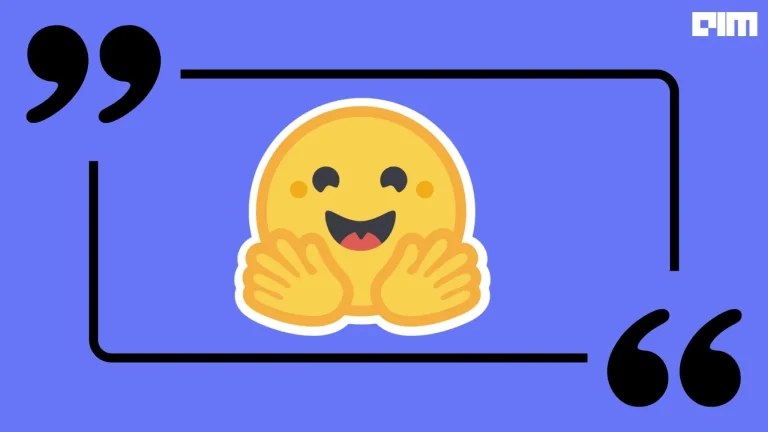Analytics India Magazine got in touch with Radhakrishnan Poomari, Chief Data Scientist and Co-Founder of Data Science Division of Xformics, for our weekly column My Journey In Data Science. Radhakrishnan has over 14 plus years of experience in commercial artificial intelligence and data science covering strategic advisory, R&D and product development roles while working for organisations like GE Power and Xformics.
The Onset
Intrigued by science fiction movies, Radhakrishnan opted for an electrical and electronics engineering at the Madurai Kamaraj University in 1997, as it offered a subject on AI in the seventh semester. “Back then everyone was opting for computer science majors, but I was not interested in the rat race,” says Radhakrishnan. However, he, along with one of his friends, were the only takers for the AI subject in the 7th semester. Consequently, the college, initially, did not agree to teach AI, but Radhakrishnan was not ready to let go of the opportunity of learning AI. He called all his friends and convinced them to choose the AI subject. Radhakrishnan explained to his classmates what AI is and how it can revolutionise the whole world in future. Eventually, more than 60% of them agreed with him and the college approved the subject — this is where Radhakrishnan’s journey in AI started.
After graduating in 2001, Radhakrishnan was reaching out to companies voluntarily proposing R&D programs specific to the products that yielded little to no success owing to the immaturity of the field and reluctance of companies to venture into futuristic ideas, especially coming from a rookie graduate. Therefore, he pursued Masters in Intelligence Systems in Sweden at the University of Halmstad from 2003 to 2005. After completing his thesis in image processing, Radhakrishnan started research in machine learning for HIV drug design to get into a PhD. Although a University accepted his application for PhD, he did not get sponsored by any company. This shattered his dream of doing a PhD in AI-related domain, which led him to come back to India.
First Data Science Job
No company in India understood what Radhakrishnan’s skills were and where to use them. Even after having solid basics in machine learning, he struggled to find a relevant job. However, a career consultant introduced him to a very niche area of law with research — Intellectual Property. “I found it very interesting as I could apply my knowledge and research in the intellectual property field,” explains Radhakrishnan. “And I started my career in a law firm, where I extracted and analysed unstructured data from research journals and patent publications.”
Unlike today, when one can use popular visualisation tools like Tableau and Power BI or libraries like Matplotlib and seaborn, early in 2006 Radhakrishnan used to create a visualisation from scratch to convey actionable insights to Fortune 500 companies. This early experience allows him to currently make custom visualisations effectively communicating meaning stories with minimal use of widely available libraries. Radhakrishnan believes that these off-the-shelf libraries often limit practitioners to represent data in the way they want. Therefore, practitioners should focus on improving their communication skills through storytelling using compelling visualisation and a simple but valid interpretation of analytics results.
Staying Relevant In The Competitive Landscape
From 2006 till 2014 he leveraged his AI skills to uncover, analyse and advise senior leaders across companies such as IBM, Motorola, GE Power for recommending technologies for R&D, IP strategy, risk assessment and mitigation, venture capital investment strategy, among others. He also helped GE Power successfully acquire companies by analysing the technological fit and synergy in offering a holistic solution to customers. To stay competitive in the landscape, Radhakrishnan relies on trial and error.
While working at GE Power, he foresaw the rise of new tools like Python in 2011 for data science workflows. He started reading books, but the codes were ineffective, which pushed him to learn on his own. He picked up open-source libraries and implemented on problems to find data-driven solutions. Today, Radhakrishnan reads a lot of journals on AI/ML and its application on various problems across diverse domains to stay abreast of the domain.
“The only strategy that I advocate aspirants or practitioners is to find an unmet need in an area one is comfortable with, spend time understanding the problem, get the required data, and develop a solution,” believes Radhakrishnan. “Showcase it to the right audience and continue to do this — Find, Solve, Showcase, Repeat. One day, the opportunity will come to you. Those who run behind opportunities are mostly not successful or get one, which is not what they want. Patience is the virtue to follow if one wants to get in and survive in the competitive data science landscape.”
Handling Rejections
Radhakrishnan said that being passionate and having perseverance about what you want to do even after being rejected continuously is the key to success. Over a span of 2-3 years, he sent around 200 applications for leadership roles when data science was non-existent. It was tough for him to get rejected, but he knew something much better was waiting to come. “Everyone has to have a passion. It is difficult to find it and even more difficult to have belief in your passion for the subject and get excited about the prospects of working on future defining AI technologies. The truth is it may not turn out as sexy as quoted in the papers after getting into the field,” says Radhakrishnan.
Current Job Role
As a chief data scientist of Xformics, Radhakrishnan develops the vision and charts out the product and technology R&D roadmap. As an architect, he makes prototypes of analytics products by identifying the unmet needs and business problems that have the maximum impact.
The most challenging part of his job is customer acquisition, which starts with educating them on how data science can bring value to their business through an ice-breaker session. Radhakrishnan said that in India, many organisations still think AI or ML is a software they can buy from off-the-shelf with a set of features. And no one wants to be the first one to step up boldly and experiment with their data to make optimal decisions.
Besides, Radhakrishnan also hires data scientists and believes that a typical interview process is very biased and does not bring out the best of a candidate. Therefore, at Xformics, aspirants have to go through a three-stage process, which is informal and designed to primarily not judge the candidate but to see if both the company and applicant are ready for a journey together. Some of the key metrics on which a candidate is evaluated are the passion for achieving their dream and communication skills. And from a technical standpoint, candidates are given a home assignment with a timeline of one week. This helps Radhakrishnan to analyse their approach towards solving a problem, choice of techniques, code quality, documentation, and the way of representing the results.
Advice To Aspirants
“Over the last 14 years, I have realised that AI and ML are just tools of the trade. Customer does not care about what technique you use or how the problem was solved. One needs to speak the customer’s language to win their trust and deliver successful outcomes. Hence, focus on putting more effort into acquiring domain knowledge for a given problem, experiment on new problems from a wide variety of domains, teach and learn from others. Finally, learn to be tolerant against failures and rejections because the universe will eventually materialise what you dream of,” concludes Radhakrishnan.

























